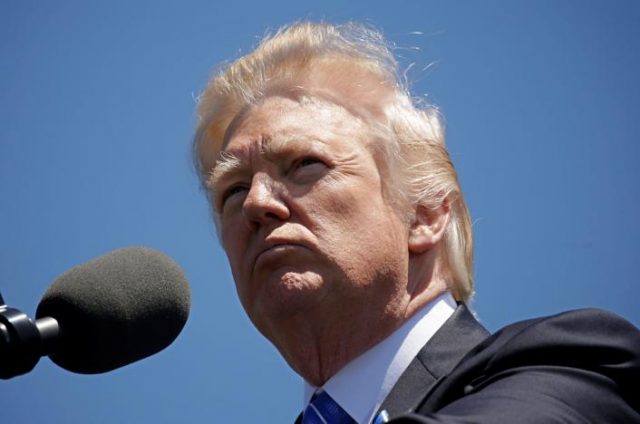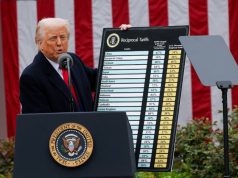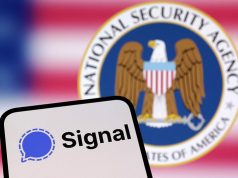
US President Donald Trump urged two senior intelligence officials in March to publicly deny there was any evidence of collusion between the Trump campaign and Russia, the Washington Post reported on Monday, citing current and former officials.
This developed as former White House national security adviser Michael Flynn declined to comply with a subpoena from the Senate Intelligence Committee as it investigates possible Russian interference in the 2016 US election.
Director of National Intelligence Dan Coats and National Security Agency Director Michael Rogers refused to comply with Trump’s requests because they believed them inappropriate, according to two current and two former officials, the Post said.
Flynn, for his part, invoked his Fifth Amendment protection against self-incrimination, according to a letter to the Senate committee from his attorney, which was obtained by Reuters.
The retired lieutenant general is a key witness in the Russia probe.
Flynn’s attorneys did not respond to multiple requests for comment.
Senators Richard Burr and Mark Warner, the top Republican and Democrat on the panel, said in a statement they were disappointed by Flynn’s decision, but would “vigorously pursue” his testimony.
The committee is conducting one of the main congressional probes into US intelligence agency reports of Russian meddling in the election and whether there was any collusion between President Donald Trump’s campaign and Russia. Moscow has repeatedly denied the allegations and Trump denies any collusion between his campaign and Russian officials.
Flynn apparently misled Pentagon investigators about his foreign connections when he sought to renew his security clearance in early 2016, according to a document obtained by congressional Democrats and released in part on Monday.
Flynn, interviewed as part of the clearance renewal process, said that all of his foreign trips as a private citizen “were funded by US companies,” according to excerpts of a March 14, 2016 report compiled by security clearance investigators.
In fact, a trip Flynn made to Moscow in December 2015, where he attended a gala dinner and sat next to Russian President Vladimir Putin, was paid for by Russia Today, which US officials consider a state-run propaganda arm, according to documents previously released by the House Oversight Committee.
The document is the latest to shed light on how Flynn received a security clearance and was subsequently hired as Trump’s national security advisor. He was forced to resign from the job in February after less than a month for failing to disclose the content of his talks with Sergei Kislyak, Russia’s ambassador to the United States, and then misleading Vice President Mike Pence about the conversations.
Excerpts were released by Rep. Elijah Cummings, ranking Democrat on the House committee.
Flynn’s decision to decline to comply with the Senate Intelligence Committee subpoena was first reported by the Associated Press.
The Senate committee first requested documents from Flynn in an April 28 letter, but he declined to cooperate with the request. Then it issued a subpoena.
In response, his attorney wrote to the committee that “the context in which the Committee has called for General Flynn’s testimonial production of documents makes clear that he has more than a reasonable apprehension that any testimony he provides could be used against him.”
Flynn’s legal team said that he was rejecting the subpoena because the committee spurned his offer, made by the retired Army general in a May 8 letter, “to give a full account of the facts and to answer the committee’s questions, should the circumstances permit, including assurances against unfair prosecution. We stated that, absent such assurances, General Flynn would respectfully decline your request for an interview and for production of documents.”
It was not clear what the committee would do if Flynn decided not to comply.
On Monday, Senator James Lankford, a Republican member of the intelligence panel, said on Twitter that Flynn was within his rights to invoke the Fifth Amendment of the US Constitution.
“We will get to the truth one way or another,” Lankford said on Twitter. “We need facts, not speculation & anonymous sources.”
Congress has the constitutional authority to enforce a subpoena.
A Congressional Research Service report outlined three main options: seeking criminal prosecution through the executive branch, asking the courts for a civil judgment and using a dormant power of “inherent contempt” to detain and imprison an individual.
The latter option has not been used in 75 years, the report said, with Congress more often relying on the criminal contempt statute recently.
US intelligence agencies concluded in January that Moscow tried to sway the November vote in Trump’s favor. Russia has denied involvement, and Trump denies any collusion between his campaign and Russia.
Reuters reported on Thursday that Flynn and other advisers to Trump’s campaign were in contact with Russian officials and others with Kremlin ties in at least 18 calls and emails during the last seven months of the US presidential race.
Two other former Trump associates — one-time campaign chairman Paul Manafort and Republican operative Roger Stone — have turned over documents the Senate panel had requested, while a third — campaign adviser Carter Page — had not yet complied, NBC News reported, citing a congressional source.
Flynn has acknowledged being a paid consultant to the Turkish government during the campaign.









